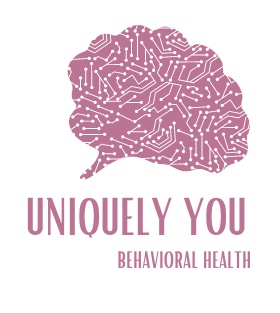More and more families are facing chellenging finanical times. During these times the need for basic necessities like food, housing, and utilities becomes even more pressing. Whether you’re facing an unexpected financial hardship or simply trying to make ends meet, finding the right resources to support your essential needs can feel overwhelming.
We understand that during times of stress it can be incredibly difficult to be able to engage in the executive function that is required to access these vital resources. Which is why we hope that this post will serve to reduce the questions and fears you have about applying for services. We will list many programs, services and business throughout. We do not endorse any of these organization. We cannot guarantee that these resources will be helpful (although we certainly hope they are). We have included resources that are state wide but did our best to focus on local resources to Will County, IL where Uniquely You Behavioral Health is located. The world is changing all the time. That means we can’t be sure that information in this blog is current (though as things are brought to our attention, we will do our best to update accordingly).
We hope that this will serve to empower you with the knowledge and tools to secure the help you deserve, and take the first step towards a more stable and secure future for you and your family.
Step 1. Identify Your Needs
- Food Assistance
- Utility Bill Assistance
- Housing Assistance
- Healthcare Assistance
- Financial Assistance
- Other Needs
- Childcare Assistance
- Disabilities ServicesTransportation Assistance
- Employment Services
Step 2. Gather Required Documentation
Most income based services will require significant amount of paperwork and identification verification to provide you with assistance. You will often need these items for all individuals living in the home. Below is a list of most commonly requested documents. If you do not have these documents follow the hyperlink to learn how to obtain that document. Many of these documents are legal documents that should be kept in a safe location. It is best practice to keep these documents in a fire proof safe or minimally in a folder so you can quickly grab is and go in the case of a catastrophic event.
- Proof of Income
- Recent pay stubs
- Tax returns
- Employment verification letters
- Identification
- Social Security numbers or ITINs
- Government-issued ID (Driver’s License, State ID, Passport)
- Birth certificates (for all household members)
- Housing Documentation
- Rental agreement or lease
- Mortgage documents
- Recent utility bills
- Eviction notice or foreclosure documents (if applicable)
- Social Security Documentation
- Social Security card(s) for all household members
- Household Bills
- Recent utility bills (electric, gas, water)
- Internet or phone bills (if required for assistance)
- Other
- Medical records (if applying for health-related assistance)
- Bank statements (if financial aid is requested)
- Proof of residency (if not included in lease or utility bill)
| Item | Got it! | Need to get | Not Applicable |
| Social Security Card | |||
| Birth Certificate | |||
| Driver’s License or State ID | |||
| Marriage License | |||
| Divorce Decree | |||
| Passport or Green Card | |||
| Military Discharge | |||
| Pay Stubs | |||
| Tax Returns | |||
| Employment Verification Letter | |||
| Rental Agreement or Mortgage documents | |||
| Recent Utility Bill | |||
| Eviction Notice or Foreclosure Documents | |||
| Bank Statements |
To access various support programs, you’ll need to meet specific eligibility criteria. Some programs require you to be a certain age, while most have income requirements, meaning your earnings need to be below a certain level. You can apply for these programs by visiting abe.illinois.gov or by calling (800) 843-6154.
Key Programs You May Qualify For
Step 3. Apply For Services
- Supplemental Nutrition Assistance Program (SNAP): Formerly known as food stamps, SNAP provides monthly funds on a LINK card, a special debit card you can use to buy food at most grocery stores.
- Medicaid and All Kids: Medicaid helps individuals with low or no income pay for medical care, including doctor visits, hospital stays, and prescriptions. All Kids is a similar program that covers healthcare for children.
- Temporary Assistance for Needy Families (TANF): Provides financial assistance to families in need.
- Aid to the Aged, Blind, and Disabled (AABD) Cash Assistance: Offers financial help to individuals who are elderly, blind, or have disabilities.
- Medicare Savings Program (MSP): Helps cover Medicare costs for older adults and people with disabilities.
Additional Resources
- Illinois Rental Assistance Program: Helps with monthly rent payments. For more information, call (866) 454-3571 or visit Illinois Rental Payment Program.
- Low Income Home Energy Assistance Program (LIHEAP): Assists with utility bills like gas and electricity. Call (877) 411-WARM (9276) or visit Utility Bill Assistance.
- Lifeline (Phone and Internet Program): Offers up to $9.25 off your phone or internet bill. Learn more at Lifeline Support.
- Child Care Assistance Program (CCAP): Provides financial assistance for childcare to parents who are working or attending school. Learn more at CCAP.
- Supplemental Security Income (SSI): Provides monthly payments to individuals aged 65 or older, or to adults and children with disabilities who have limited income and resources. Visit SSI Eligibility for more information.
Local Assistance Programs
- Will County Center for Community Concerns (WCCCC)
- What It Is: Provides financial assistance through the Low-Income Household Water Assistance Program (LIHWAP) for water and wastewater bills, up to $1,500 for those facing disconnection.
- Eligibility: Households earning up to 200% of the federal poverty guideline. Income limits: 1 person – $2,430, 2 people – $3,287, 3 people – $4,143, 4 people – $5,000 (see liheapillinois.com for details on larger households).
- How to Apply: Call (815) 722-0722 for application details and required documents.
- Documentation Required: Proof of income, Social Security numbers or ITINs, recent utility bills, rental agreement if applicable.
- Lockport Township General Assistance Office
- What It Is: Offers financial aid for rent, mortgage, utility bills, and other needs during economic hardships.
- Documents Required: Social Security card(s), ID, birth certificates, lease/mortgage documents, recent pay stubs, utility bills.
- Process: Initial interview required. Call (815) 838-4161.
- The Salvation Army – Joliet Corps Community Center
- What It Is: Provides financial assistance for Illinois American Water bills, energy, and heating expenses, along with food and other support services.
- Contact: 300 Third Ave., Joliet, IL 60433. Phone: (815) 726-4834.
- Daybreak Center
- What It Is: Offers financial assistance for utilities, rent, temporary housing, food, and other needs, depending on resource availability.
- Contact: 611 E. Cass Street, Joliet, IL 60432. Phone: (815) 774-4663.
- Lockport Township Office
- What It Is: Assists with emergency financial assistance for utilities, including water bills, for Lockport residents.
- Contact: (815) 838-0549.
- United Way of Will County
- What It Is: Provides financial assistance and referrals for utility bills.
- Contact: Call 2-1-1 for information on available services and eligibility.
- Salvation Army – Will County
- What It Is: Offers emergency assistance for utility bills, including water, for qualifying residents.
- Contact: (815) 726-4834.
- Illinois Department of Human Services (DHS) – Will County
- What It Is: Provides various financial aid programs, including for utility bills.
- Contact: (815) 740-5350.
Getting Your Birth Certificate:
To obtain your birth certificate, you’ll need to mail in a form. You can find the necessary forms on the Illinois Department of Public Health website. Be sure to have:
- Verification of your current address.
- $15 for the first copy and $2 for each additional copy.
Getting Your Social Security Card:
If you’ve lost your Social Security card, you can request a replacement for free. You’ll need:
- Your birth certificate.
- A completed form, which you can find on the Social Security Administration website.
State ID or Driver’s License:
To get a state ID or driver’s license, visit a Driver Services facility. You’ll need documents like your birth certificate, Social Security card, and proof of Illinois residency. For more details, visit Illinois Driver Services.
Help with Rent and Utilities:
If you need assistance with rent or utilities, several programs can help:
- Illinois Rental Assistance Program: Apply at an IDHS office or call (866) 454-3571.
- Community Action Agencies: Provide help with rent and other services. Call 2-1-1 to find a nearby agency.
Housing Rights:
Be aware of your housing rights under federal and state laws. If a landlord violates these rights, you can file a complaint. For more information, visit HUD’s Tenant Rights.
Health Insurance Options:
Health insurance can help cover medical expenses. Here are some options:
- Medicaid and Medicare: Government programs for eligible individuals. Apply at Healthcare.gov.
- Affordable Connectivity Program: Offers up to $75 per month toward your internet bill. Learn more at CHA Digital Inclusion.

